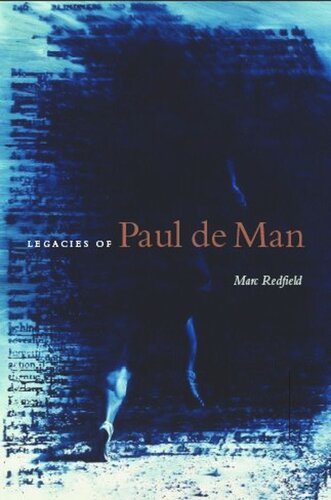

Most ebook files are in PDF format, so you can easily read them using various software such as Foxit Reader or directly on the Google Chrome browser.
Some ebook files are released by publishers in other formats such as .awz, .mobi, .epub, .fb2, etc. You may need to install specific software to read these formats on mobile/PC, such as Calibre.
Please read the tutorial at this link: https://ebookbell.com/faq
We offer FREE conversion to the popular formats you request; however, this may take some time. Therefore, right after payment, please email us, and we will try to provide the service as quickly as possible.
For some exceptional file formats or broken links (if any), please refrain from opening any disputes. Instead, email us first, and we will try to assist within a maximum of 6 hours.
EbookBell Team

4.0
96 reviewsMore than twenty years after his death, Paul de Man remains a haunting presence in the American academy. His name is linked not just with "deconstruction," but with a "deconstruction in America" that continues to disturb the scholarly and pedagogical institution it inhabits. The academy seems driven to characterize "de Manian deconstruction," again and again, as dead. Such reiterated acts of exorcism testify that de Man's ghost has in fact never been laid to rest, and for good reason: a dispassionate survey of recent trends in critical theory and practice reveals that de Man's influence is considerable and ongoing. His name still commands an aura of excitement, even danger: it stands for the pressure of a text and a "theory" that resists easy assimilation or containment. The essays in this volume analyze and evaluate aspects of de Man's strange, powerful legacy. The opening contributions focus on his great theme of "reading"; subsequent chapters explore his complex notions of "history," "materiality," and "aesthetic ideology," and examine his institutional role as a teacher and, more generally, as a charismatic figure associated with the fortunes of "theory." Because the notion of legacy immediately raises questions about the institutional transmission of thought, the collection concludes with two appendixes offering documentary aids to scholars interested in de Man as an institutional presence and pedagogue. The first appendix lists the courses taught by de Man at Yale; the second makes available a previously unpublished document, almost certainly authored by de Man: a course proposal for the undergraduate course "Literature Z" that de Man and Geoffrey Hartman began teaching at Yale in the spring of 1977.